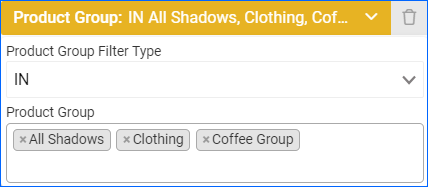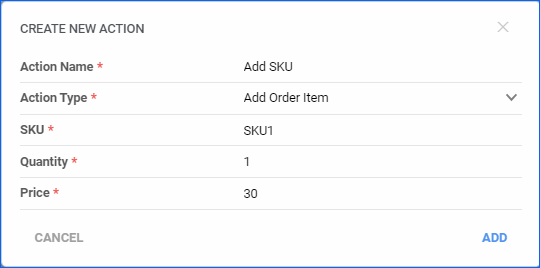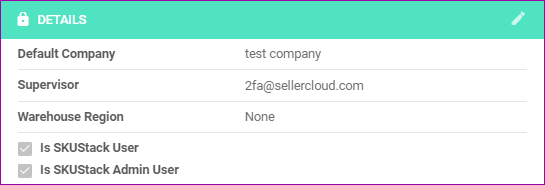We have updated the way the Product Group filter functions on all Manage pages: Catalog, Orders, Inventory, POs, Predictive Purchasing. You can now select multiple groups for your search, and the results will contain products from all selected groups independently. This means that if SKU A is in one group only, and you have selected its group along with others in the filter, SKU A will still show up. You are also now able to use the filter to search for products within a group or to exclude products contained in certain groups with the NOT IN option. This will give you more flexibility, especially in terms of using saved searches for Reports and Scheduled Tasks.
Product Serials Report in Delta
We have added the Product Serials Report to our Delta interface. Previously only available in the Skustack Admin Portal, you can now track the history of product activity, such as Purchase Orders, Orders, and FBA Inbound Shipments, associated with specific Serial Numbers.
Clone Vendor Price
Cloning a Product in Sellercloud creates a new product in your catalog, which is a copy of the original item, but without some key information, such as inventory, cost, and price. However, you still have the ability to copy over some details. Along with the ASIN and UPC, we have now also added the option to replicate all the existing Vendor Prices.
Rule Engine: Add Order Item
We have created a new action in the Order Rule Engine to Add Order Item. With this action, you can automate adding specific SKUs to orders based on the rule’s conditions. You can select one SKU per action, and you will have to configure the price and quantity to appear on the order. This can be especially useful when items in your catalog require a digital product, such as a warranty or insurance. Another use can be to add complimentary items or samples along with the original order, based, for example, on the customer. 
Queued Jobs Access Restriction
We have added a new icon to the Queued Jobs panel on the Employee Permissions page. When you click it, you will Enable Access to Only Self-Submitted Jobs for that user, and they will only be able to access the Queued Jobs they have submitted themselves. This is an additional security measure that will prevent employees from being able to view and download the generated export files for jobs, which may contain sensitive financial data, customer information, or anything else they wouldn’t otherwise have access to.
Skustack Admin Login Restrictions
We have added a new security measure regarding which users have access to the Skustack Admin Portal. Going forward, only client Admins will automatically have the ability to log in. All users marked as Employees will need to be invited by a Client Admin. This can be done in two ways within the Admin Portal:
Apply Permissions To Newly Created Companies
In Sellerloud, users can have one of two Roles, Client Admin or Employee, which determines permissions and access for that user across the interface and its functionalities. While a Client Admin will always have access to the whole account, Employee permissions are very flexible and once configured, you can decide which companies they would apply to. We have added a new checkbox to Apply Permissions To Newly Created Companies. When checked, the employee will automatically receive the same permissions, whenever a brand new company is created in your account.
API Endpoints | Split PO, Get PO by View, Get PO Views, and Update Order Columns
We have added four new endpoints to our Rest API:
- Split Purchase Order – use this endpoint for cases when you need to Split an existing Purchase order.
- Get Purchase Orders By View – use this endpoint to get the details of a list of Purchase orders by using an existing PO Saved View.
- Get PO Saved Views – use this endpoint to get the list of your existing Purchase Order Saved Views. The response body will return a list of your Saved views, including the View Name and numerical ID.
- Update Multiple Custom Columns for Order – use this endpoint to update the values for multiple existing Custom Order Columns at once.
Amazon Transparency Code Changes
We now support sending Transparency Codes to Amazon in the Shipping Notice for international marketplaces. Amazon Transparency is a global service, and we have made accommodations for it, ensuring that if an order item is flagged as transparency-enabled, we will include the code when sending tracking information. Additionally, we have added a new column to the manual import option for Amazon Transparency code import. You can now use Channel Order IDs to match transparency codes for orders not shipped via Shipbridge. 
Multiple Tracking Numbers for RMA
By default, RMAs can only have one tracking number unless your account has been specifically configured to allow multiple. We have moved the setting Enable Multiple Tracking Numbers For RMA, which controls the functionality, away from the Admin level of your server, to the Client Settings. We have made this change in order to give you more flexibility and allow you to more easily configure your account. When you enable the setting, you will be able to record and manage multiple tracking numbers per each RMA.

